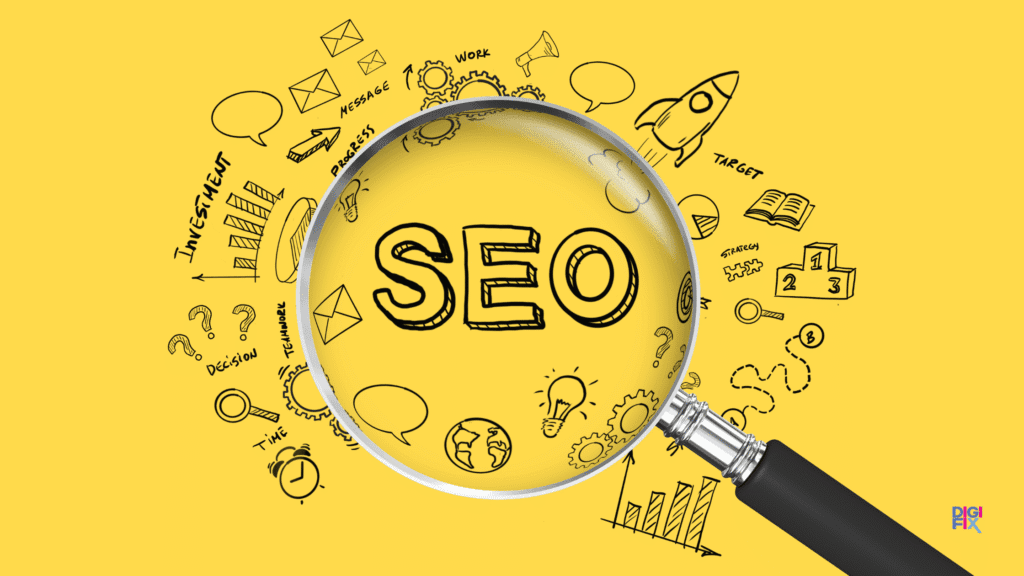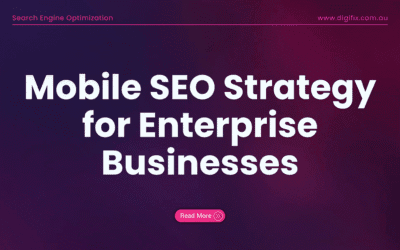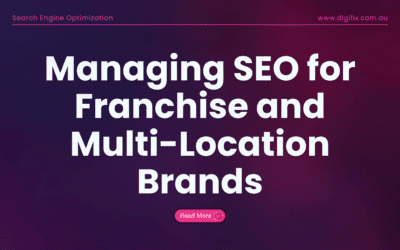In today’s digital-first economy, most customers begin their journey with a search. Whether it’s finding a product, a nearby service, or a solution to a problem, the answer often lies on Google’s first page. That’s why Search Engine Optimization (SEO) has become a core pillar of modern marketing.
This guide will break down the top advantages of SEO for businesses— with practical examples to show you exactly how it works.
What Is SEO?

Before diving into the advantages of SEO, let’s try to understand what is SEO?
SEO, or Search Engine Optimization, is improving your website to rank higher in search engine results — like Google — when people search for information related to your business.
Imagine someone typing “best Italian Restaurant near me” into Google. The results they see on the first page haven’t shown up by accident. They got there because those websites are well-optimized for search engines.
SEO helps your website show up when potential customers search for:
- Products you sell (e.g., “leather jackets Australia”)
- Services you offer (e.g., “plumber in Melbourne”)
- Questions you can answer (e.g., “how to fix a leaking tap”)
In Simple Terms:
SEO is about helping search engines understand your website so they show it to the right people at the right time.
SEO helps you compete, grow, and get found online — without paying for every click.
Key Advantages of SEO for Businesses
1. SEO Helps People Find Your Business Online
One of SEO’s most obvious but powerful advantages is discoverability. When someone searches for a solution or product you offer, SEO helps your business show up on the results page—ideally, at the top.
According to a 2024 Google Consumer Insights report, over 50% of users discover new brands or products through search. That means your next customer is probably already searching — the question is, will they find you?
For example, a landscaping company in Melbourne that ranks as the “best garden maintenance Melbourne” will receive regular inquiries — even from people who have never heard of the brand.
With effective SEO, you don’t chase leads — they come to you.
2. SEO Builds Long-Term Credibility and Trust
High search rankings are more than visibility — they signal credibility. Users trust Google. If your business appears at the top of search results, it sends a powerful message: this brand is reliable.
Google’s E-E-A-T framework (Experience, Expertise, Authoritativeness, Trustworthiness) is the foundation of that trust. SEO strategies that align with E-E-A-T include:
- Publishing in-depth, accurate, and helpful content
- Featuring genuine customer reviews and case studies
- Demonstrating industry experience and credentials
- Regularly updating your website to stay relevant
Example:
A law firm that publishes content on topics like “how to handle workplace harassment” or “contract review checklist” not only attracts search traffic — it also positions itself as a trusted authority. That perceived authority directly influences decision-making.
3. SEO Works for You 24/7
Unlike paid advertising, which stops when your budget runs out, SEO delivers continuous results. Once your pages rank, they drive traffic — even outside business hours.
This means your website is essentially a full-time sales and lead generation tool, operating 24/7 without ongoing media spend.
Example:
A SaaS company that ranks as “free CRM software for small business” will continue to receive demo signups from all over the world, regardless of office hours. That’s the kind of scalability SEO offers.
4. SEO Increases Brand Visibility and Awareness
Every time your business appears in search results — even if a user doesn’t click — you’re reinforcing your brand. Over time, this builds top-of-mind awareness, a critical step in the customer journey.
Visibility in multiple keyword searches makes your brand familiar, even before a prospect is ready to buy.
Example:
An e-commerce clothing store appearing for terms like “sustainable activewear,” “yoga leggings Australia,” and “gym wear for women” becomes associated with fitness apparel, even if the user waits a few days before purchasing.
5. SEO Drives High-Quality, Intent-Driven Leads
SEO doesn’t just bring in traffic — it brings in the right kind of traffic. People using search engines are actively looking for information, solutions, or products. They’re motivated, and they’re much closer to conversion.
By optimising for intent-driven keywords, you attract users who are already considering a purchase.
Example:
Someone searching “affordable digital marketing agency in Melbourne” has a much higher chance of becoming a client than someone scrolling through Instagram. That’s the difference between passive exposure and intent-based targeting.
6. SEO Attracts Local Customers
Local SEO helps businesses appear in searches that include location-based intent, especially useful for restaurants, clinics, retailers, and service providers.
By optimising for “near me” searches, adding your business to Google Maps, and earning local reviews, you can dominate your service area.
Example:
A dentist in Brisbane who optimises for “emergency dentist near me” or “teeth whitening Brisbane CBD” will show up in Google’s local pack — the map-based listings that get the most clicks in local searches.
7. SEO Enhances the Performance of Other Marketing Channels
The content you create for SEO — such as blogs, product pages, and guides — can power your email marketing, social media, paid ads, and even offline campaigns.
SEO also uncovers valuable audience insights that can shape your overall strategy, such as what your customers search for and how they behave online.
Example:
If an SEO blog on “eco-friendly packaging ideas” gets high traffic, that same content can be turned into Instagram posts, lead magnets, or part of a webinar series. SEO is the engine behind a lot of repurposed marketing content.
8. SEO Targets Every Stage of the Buyer Journey
A smart SEO strategy doesn’t just aim for purchase-intent keywords. It creates content for every stage of the funnel:
- Top of Funnel (Awareness): “What is CRM software?”
- Middle of Funnel (Consideration): “Best CRM tools for small businesses”
- Bottom of Funnel (Decision): “Buy CRM software with email automation”
By mapping content to user intent, SEO helps move people from first touch to final conversion.
Example:
A skincare brand might have educational blogs (“how to choose the right serum”), product comparison pages, and purchase-focused landing pages — all working together to guide the buyer’s journey.
9. SEO Supports and Improves PPC Campaigns
SEO and paid search do not compete — they complement each other. Your brand dominates the results page, when your website ranks organically and appears in ads for the same search terms.
SEO can also reduce your dependency on paid ads, leading to long-term savings.
Example:
A real estate agency running Google Ads for “apartments in Fitzroy” will benefit more if they also rank organically for that term. It increases visibility, reinforces trust, and captures users who skip past ads.
10. SEO Helps You Outrank Competitors
If your competitors are investing in SEO and you are not, they will appear in search results while your business remains invisible.
The competitive advantage of SEO is that it allows smaller or newer businesses to compete with industry leaders by being more strategic, consistent, and user-focused.
Example:
A startup IT service provider that regularly publishes technical tutorials, cybersecurity tips, and case studies can outrank a larger but inactive competitor in organic search — purely through better content and optimisation.
11. SEO Strengthens Your Overall Digital Presence
SEO forces you to improve site speed, mobile responsiveness, user experience (UX), and content quality — all of which enhance your broader online performance.
Google ranks sites that are useful, fast, and accessible. These same qualities also reduce bounce rates, improve time on site, and increase conversion rates.
Example:
An online store that improves page speed for SEO purposes will also see higher customer satisfaction, more purchases, and better ROI from all marketing efforts.
12. SEO Is Cost-Effective and Delivers Long-Term ROI
Unlike paid media, where visibility disappears the moment you stop paying, SEO delivers long-term results. Yes, it requires ongoing effort — but the returns compound over time.
Content that ranks well can generate thousands of visits (and leads) for months or years without additional spend.
Example:
A mortgage broker who creates a “First-Time Home Buyer Checklist” blog may find that it consistently brings in leads year after year with only minor updates. That’s an asset — not an expense.
13. SEO Provides Valuable Customer Insights
By analysing keyword data, search trends, and traffic behaviour, SEO reveals what your audience wants — and how they search for it.
Google classifies search intent into four categories:
- Informational: e.g., “how does SEO work?”
- Navigational: e.g., “Facebook login”
- Commercial: e.g., “best accounting software for small business”
- Transactional: e.g., “buy accounting software online”
It helps you understand what stage your customers are, and tailor content and offers accordingly.
Final Thoughts: The Real Advantages of SEO for Your Business
The advantages of SEO go beyond just traffic. It builds trust, increases visibility, generates leads, and supports every part of your digital marketing strategy. Most importantly, it helps businesses grow in a scalable, cost-effective, and sustainable way.
If you’re serious about long-term growth, SEO isn’t optional — it’s essential.
Need help implementing an SEO strategy that works?
Let our team at DigiFix craft a custom SEO roadmap that gets you real, measurable results. Whether you’re a Large-scale, medium, or enterprise, we help businesses like yours rank higher, convert better, and grow faster.





0 Comments